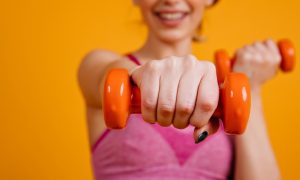The holiday season is nearly upon us, and for many dancers, that means a break from their rigorous dance schedule. That can be a shock, though, and you may feel nervous about how to keep healthy over the break, with the temptation of holiday cookies and all… But there is a way to find that balance between enjoying the special season and being ready to come back strong come January. Here are Dance Informa’s top 10 holiday dos and don’ts for keeping the body healthy.
#1. Do take time to breathe.
Be kind and gentle to yourself. Allow time to breathe, and to enjoy the little moments. Even in the midst of holiday chaos, this time doesn’t last forever. Do what is right for you. If you need to take a breath, then do it.
#2. Don’t worry about what other people are or aren’t eating.
Don’t get caught up in others’ eating habits. Just because your friend is following the latest diet trend or your sister is talking about her weight, it does not mean you have to be influenced by that. It has nothing to do with you. That’s about them. The amount of calories and nutrients you need to sustain your energy and strength is completely unique to you. Fuel your body and mind in a way that supports your ability to get through the holidays in a way that you start the new year in a good place and not a place of defeat or punishment.
#3. Do continue to eat regular meals and snacks…and start your day with breakfast!
Even if you’re not as active over the break, it’s still important to eat well, to support your metabolism, maintain muscle mass and stabilise blood sugar. You’ll be in a better mood, feel less anxious and will be less likely to overeat in the evenings. We know you’re busy. But eat breakfast anyway.
#4. Don’t keep too many sweets and treats in the house.
This can lead to overindulging. And this could potentially set up a negative cycle of overindulgence, then feeling guilt about food and then restrictive eating.
#5. Do allow yourself to enjoy sweet treats in a social environment.
Enjoy this time of celebration. It’s a beautiful thing to eat a few of your aunt’s holiday cookies, or your neighbor’s special recipe, or a slice of that pie that only comes around once a year. Enjoying a serving of something delicious like that is a healthy way to enjoy life. And that is not the same as overeating alone at home.
#6. Don’t let guilt over food make you feel bad about who you are as a person.
Our food choices do not define our self-worth. Enjoying some holiday treats with friends will not derail an otherwise healthy diet. Guilt all too often leads to restricting food, which leads to hunger and then overeating. Drop the guilt, and keep your blood sugar stable by eating what your body needs when your body needs it.
#7. Do make sure you’re still getting a dietary foundation of plant-based foods.
This means fruits, vegetables, whole grains, and plant-based proteins like beans, lentils, peas and soy. When your foundation is built on regular, healthy, high fiber plant choices, it doesn’t matter if you have an occasional holiday treat. And it also helps maintain muscle mass so you can start the new year in a strong place. Keep a big bowl of apples and clementines on your counter for a healthy, easy snack. Make a point of eating at least one for a snack and pairing a fruit with a grain or protein if you need more energy.
#8. Don’t overconsume sugary beverages, coffee drinks or alcohol.
This includes “energy drinks”. Some special holiday coffee beverages can have up to 600 calories. Consider them like a dessert. Fine on occasion but not something to have every day.
#9. Do keep up with your vitamins and supplements, particularly vitamin D.
Since you’re not getting as much sun in the winter, it’s often necessary to supplement this one. Vitamin D is not only important in bone strength, but it’s also a hormone that boosts the immune system, mental health and focus.
#10. Don’t forget to cross-train.
Continue to cross-train when you’re taking a break from dance. It’s a great way to keep supporting muscles strong and reduce injury risk when you return in January.

By Emily C. Harrison MS, RDN, LDN of Nutrition for Great Performances.
Emily Cook Harrison MS, RD, LD
Emily is a registered dietitian and holds both a bachelor’s and master’s degree in nutrition from Georgia State University, USA. Her master’s thesis research was on elite level ballet dancers and nutrition and she has experience providing nutrition services for weight management, sports nutrition, disordered eating, disease prevention, and food allergies. Emily was a professional dancer for eleven years with the Atlanta Ballet and several other companies. She is a dance educator and the mother of two young children. She now runs the Centre for Dance Nutrition and Healthy Lifestyles. She can be reached at emily@dancernutrition.com
www.dancernutrition.com














